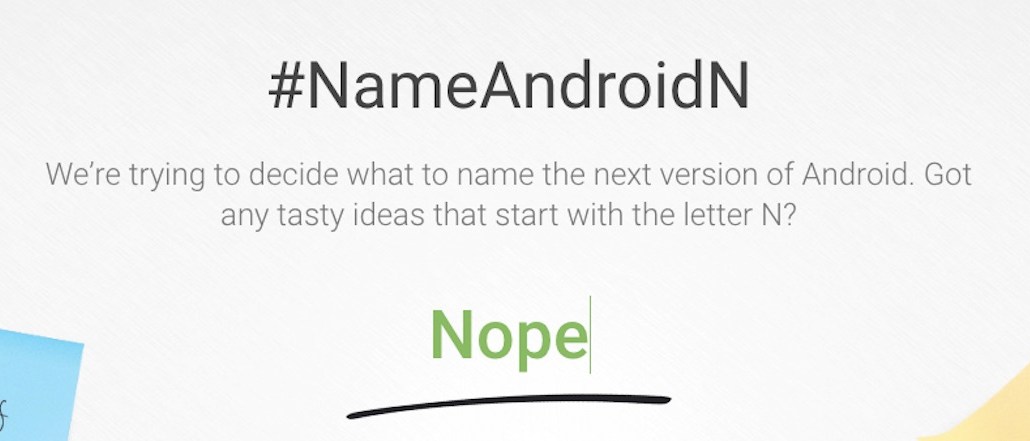
Google, of all companies, should’ve searched the drawbacks of letting the internet name things.
During yesterday’s I/O developer conference, Google showed off its latest, untitled Android operating system. In keeping with the tradition of naming its operating systems in alphabetical order, this latest version will begin with the letter N. And Google wants the Internet’s help.
Google starts off innocently enough, with the website asking people for “any tasty ideas that start with the letter N.” There’s also a hashtag: #NameAndroidN.
Turns out, asking people for N-words is a bad idea.
Google apparently didn’t learn from Microsoft’s disaster with its AI chatbot Tay which was hacked to spew hate speech and forgot to apply a filter on the website, resulting in submissions like this:
Oh man, @google, you really didn’t think this one through. “Nazi” is also allowed! #io16 pic.twitter.com/xVNR8lCnqP
— Patrick Lucas Austin (@patbits) May 18, 2016
People also submitted other ideas, too:
So lets give Android a meaningful name, something that says what it is #NameAndroidN pic.twitter.com/MGe50yPKWH
— Jonathan Fielding (@JonthanFielding) May 19, 2016
New phone required#NameAndroidN
— SecuriTay (@SwiftOnSecurity) May 19, 2016
#NameAndroidN Namey McNameFace… oh… we can’t have that?
— Hamish Thompson (@Hamwado) May 18, 2016
There was, of course, also a thread on 4Chan, the message board notorious for trolling the internet, which has since since been deleted.
Google saved itself from a Boaty McBoatface-style disaster in that the contest isn’t a poll, rather an open-ended submission process where Google can ignore distasteful entries. Still, it’s another lesson for brands tempted to believe that the internet is even remotely capable of acting civilized.
More in Marketing

YouTube’s upmarket TV push still runs on mid-funnel DNA
YouTube is balancing wanting to be premium TV, the short-form powerhouse and a creator economy engine all at once.

Digiday ranks the best and worst Super Bowl 2026 ads
Now that the dust has settled, it’s time to reflect on the best and worst commercials from Super Bowl 2026.

In the age of AI content, The Super Bowl felt old-fashioned
The Super Bowl is one of the last places where brands are reminded that cultural likeness is easy but shared experience is earned.





